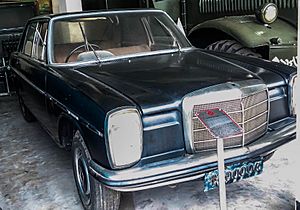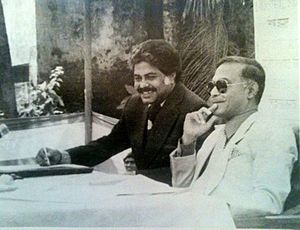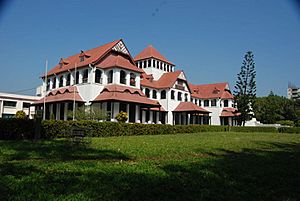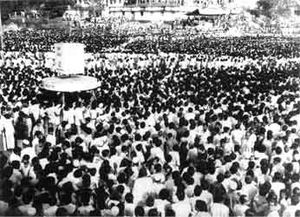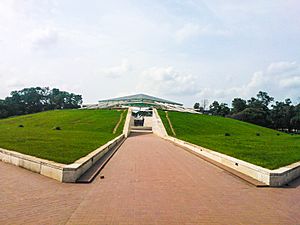Ziaur Rahman facts for kids
Quick facts for kids
Lieutenant General
Ziaur Rahman
Bir Uttom, Hilal-i-Jur'at
|
|
|---|---|
|
জিয়াউর রহমান
|
|
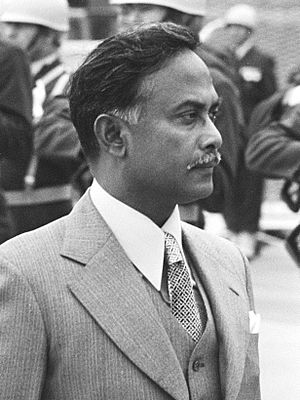
Rahman in 1979 in the Netherlands
|
|
| President of Bangladesh | |
| In office 21 April 1977 – 30 May 1981 |
|
| Prime Minister |
|
| Vice President | Abdus Sattar |
| Preceded by | Abu Sadat Mohammad Sayem |
| Succeeded by | Abdus Sattar |
| Chairman of the Nationalist Party | |
| In office 1 September 1978 – 30 May 1981 |
|
| Preceded by | Position established |
| Succeeded by | Abdus Sattar |
| 2nd Chief of Army Staff |
|
| In office 24 August 1975 – 3 November 1975 |
|
| Preceded by | K. M. Shafiullah |
| Succeeded by | Khaled Mosharraf |
| In office 7 November 1975 – 28 April 1978 |
|
| Preceded by | Khaled Mosharraf |
| Succeeded by | Hussain Muhammad Ershad |
| Personal details | |
| Born | 19 January 1936 Bagbari, Bogra District, Bengal Presidency, British India |
| Died | 30 May 1981 (aged 45) Chittagong, Bangladesh |
| Cause of death | Assassination |
| Resting place | Mausoleum of Ziaur Rahman |
| Nationality |
|
| Political party | Bangladesh Nationalist Party |
| Spouse | |
| Children |
|
| Relatives | Majumdar-Zia family |
| Alma mater |
|
| Military service | |
| Allegiance |
|
| Branch/service |
|
| Years of service |
|
| Rank | |
| Unit | |
| Commands |
|
Ziaur Rahman (born January 19, 1936 – died May 30, 1981) was a military officer and politician from Bangladesh. He served as the President of Bangladesh from 1977 to 1981. Sadly, he was assassinated in Chittagong in 1981 during a military uprising.
Rahman was a brave commander during Bangladesh's War of Independence in 1971. He led different groups of fighters, including "Z Force." He also made an important announcement about Bangladesh's independence on March 27, 1971. After the war, he became a top leader in the Bangladesh Army. He became president in 1977.
As president, Rahman started the Bangladesh Nationalist Party (BNP) in 1978. He brought back multi-party politics, allowing different political groups to exist. He also worked to improve the economy, focusing on farming and food production. He helped create a group for South Asian countries, which later became SAARC. Rahman also improved Bangladesh's relationships with Western countries and China. He received two special awards for his bravery in wars: the Hilal-i-Jurat and the Bir Uttom.
Contents
Early Life and Education
Ziaur Rahman was born on January 19, 1936, in a village called Bagbari in Bogra District. His father, Mansur Rahman, was a chemist. His mother's name was Jahanara Khatun. Ziaur Rahman grew up in his home village and went to school in Bogra.
In 1946, he attended Hare School in Kolkata for a short time. After India and Pakistan became separate countries in 1947, his family moved to Karachi, Pakistan. Zia, at 11 years old, continued his studies there. He finished his high school education in Karachi in 1952.
In 1953, Rahman joined the Pakistan Military Academy to become an army officer. In August 1960, he married Khaleda Khanam Putul, who later became known as Khaleda Zia. She would also serve as the Prime Minister of Bangladesh three times.
Military Career in Pakistan Army
Rahman graduated from the Pakistan Military Academy in 1955. He became a second lieutenant in the Pakistan Army. He received special training, including commando and paratrooper skills.
He later joined the East Bengal Regiment in 1957. He also worked in military intelligence. During the Indo-Pakistani War of 1965, Rahman fought bravely in battle. He was awarded the Hilal-i-Jur'at, which was Pakistan's second-highest military award.
In 1966, Rahman became a military instructor. He helped create new Bengali army groups. His first son, Tarique Rahman, was born in 1966. Rahman also received advanced military training in West Germany and with the British Army.
Leading up to Independence
In October 1970, Rahman was stationed in Chittagong, East Pakistan. At this time, East Pakistan had suffered a terrible cyclone, and people were unhappy with the central government's slow help. There was also a lot of political tension between the two main parties: Sheikh Mujibur Rahman's Awami League and Zulfiqar Ali Bhutto's Pakistan People's Party.
The Awami League won the 1970 elections, but the President of Pakistan, Yahya Khan, delayed the new government from forming.
Bangladesh War of Liberation (1971)
After talks failed, President Yahya Khan declared martial law. He ordered the army to stop political activities in East Pakistan. Sheikh Mujibur Rahman was arrested on March 26, 1971.
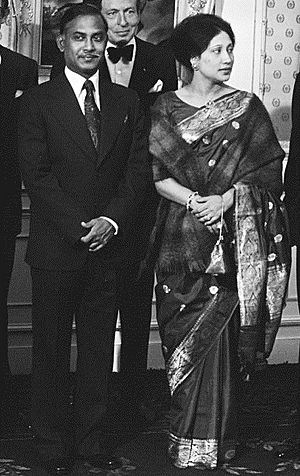
Ziaur Rahman decided to revolt against the Pakistani government. He arrested his commanding officer. Local political leaders asked him to announce the Declaration of Independence. Sheikh Mujibur Rahman had already made this declaration earlier. However, an army officer's announcement would help people trust the news.
Rahman gathered Bengali soldiers from different military groups in Chittagong. He created a fighting unit called Sector No. 1. Later, he formed Sector 11. These groups were part of the Mukti Bahini, also known as the Bangladesh Forces.
On July 30, 1971, Rahman was made the commander of the first major fighting group of the Bangladesh Forces. It was named "Z Force" after his first initial. This group helped Rahman launch big attacks against Pakistani forces. For his bravery, Rahman received the Bir Uttom award, Bangladesh's second-highest military honor.
After the War: 1975 Events
After the war, there was a lot of political unrest in Bangladesh. On August 15, 1975, President Sheikh Mujibur Rahman and his family were killed in a military coup. Khondaker Mostaq Ahmad, a cabinet minister, became president.
Major General Ziaur Rahman, who was the deputy chief of army staff, was appointed as the new army chief. However, the country remained unstable. On November 3, 1975, another military group revolted, and Ziaur Rahman was put under house arrest.
A few days later, on November 7, a "Soldiers and People's Coup" took place. Ziaur Rahman was freed and re-appointed as army chief. He then worked to bring order back to the army and the country.
Becoming President
Ziaur Rahman became the President of Bangladesh on April 21, 1977. At that time, Bangladesh faced many challenges, including poverty and economic problems. As president, Rahman lifted martial law and started many changes to help the country grow.
In late 1977, there was a failed attempt to overthrow his government. After this, Rahman took steps to strengthen the military and security forces. He increased the size of the police and army. In 1978, he appointed Hussain Muhammad Ershad as the new Chief of Army Staff.
Elections and Policies
In 1978, General Rahman won a five-year term as president in an election. The next year, elections were held for the National Assembly.
Rahman allowed Sheikh Hasina, Sheikh Mujibur Rahman's daughter, to return to Bangladesh in 1981.
His government focused on improving the economy. He launched a "19-point program" to encourage self-reliance, rural development, and free markets. Rahman traveled across the country, encouraging people to work hard and produce more food. He started projects to build irrigation canals, power stations, and roads. He also promoted education in rural areas. During his time, Bangladesh saw good economic growth.
Rahman also changed Bangladesh's foreign policy. He moved away from close ties with India and the Soviet Union. Instead, he built stronger relationships with the United States, Western Europe, and Middle Eastern countries like Saudi Arabia. He also improved ties with China and Pakistan.
He suggested creating a group of South Asian nations to work together on economic and political issues. This idea led to the formation of the SAARC in 1985.
Islam and National Identity
Rahman believed that many people in Bangladesh felt unsure about their identity. He wanted to strengthen their sense of nationhood and religious identity. He made changes to the constitution, adding phrases like "In the name of Allah, the Beneficent, the Merciful." He also said that the state should try to build strong relationships with Muslim countries.
He introduced Islamic religious education as a required subject for Muslim students. He also allowed religious political parties, which had been banned earlier, to return to politics.
Rahman promoted "Bangladesh Nationalism," which focused on a national identity rather than just a Bengali ethnic identity. He included non-Bengali minority groups in this idea. He even changed the constitution so that citizens were called "Bangladeshi" instead of "Bengali."
Assassination
On May 29, 1981, Rahman traveled to Chittagong to help solve a political problem within his party. He stayed overnight at the Chittagong Circuit House. In the early morning of May 30, a group of army officers assassinated him.
About two million people attended his funeral, which was held at the Parliament Square.
Legacy and Impact
Many people in Bangladesh see Ziaur Rahman as a war hero. He is praised for bringing stability after a period of disorder and for re-establishing democracy. His economic changes are also credited with helping to rebuild the country's economy. His focus on Islam and Bangladeshi nationalism was popular with many ordinary people.
However, some critics say he was harsh on those who opposed him.
Family Life
Ziaur Rahman and Khaleda Zia had two sons, Tareq Rahman and Arafat Rahman (who died in 2015). After Rahman's death, his wife, Khaleda Zia, became the leader of the BNP. She later served as the first female Prime Minister of Bangladesh three times.
Honors and Awards
Ziaur Rahman received several honors for his service:
- Pakistan: Hilal-i-Jur'at
- Egypt: Order of the Nile
- Yugoslavia: Order of the Yugoslav Star
- North Korea: Hero of the Republic
A road in Ankara, Turkey, is named Ziaur Rahman Caddesi in his honor. In 2004, he was ranked among the greatest Bengalis of all time in a BBC poll. He was also honored by the South Asian Association for Regional Cooperation for his vision.
See also
 In Spanish: Ziaur Rahman para niños
In Spanish: Ziaur Rahman para niños
- BM Abbas
 | Anna J. Cooper |
 | Mary McLeod Bethune |
 | Lillie Mae Bradford |


